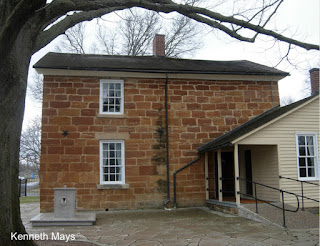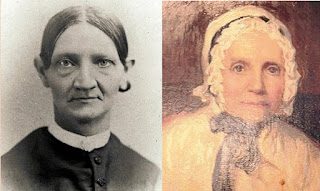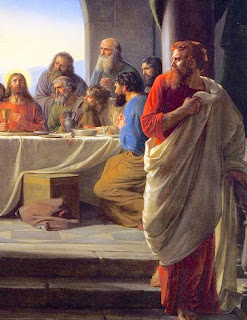“Jesus had a trusted disciple who turned on him. Joseph had Williams who plotted his murder and in all probability was in the mob that did murder Joseph. He had plenty of reasons (his adultery, power, jealousy, etc). Just because a man is intelligent does not mean he is righteous. Williams was a Judas. I would not accept anything Judas wrote without confirmation. Same for Williams” Jerry S.
What an amazing accusation. Let’s take each point one at a time:
Carthage Jail.
Upper window is where Joseph, Hyrum, John Taylor and Willard Richards were
located when 150 mobsters attacked on June 27, 1844
2. Adultery. Williams was not involved in any adultery, accusations, or anything of the kind. He was one of the three men (including Oliver Cowdery and Sidney Rigdon) that William McLellin claimed Emma Smith went to upon hearing Joseph Smith had a polygamous affair with a Fanny Alger. McLellin, wrote this in 1872, where he claimed to have visited Emma in 1847 when she discussed this with him. However, though McClellan was once an Apostle, he had been excommunicated for apostasy and immoral behavior more than thirty years earlier than when he made this claim, and there is no other claim to this event ever happening. Other than this, there is absolutely no connection of Williams with any claim regarding adultery or immorality.
3. Power and Jealousy. The funny thing is, Frederick G. Williams was well known for his shyness and lack of authoritative interest. Joseph did say of John Whitmer, David Whitmer, Oliver Cowdery, and Martin Harris, that they “are too mean to mention; and we had liked to have forgotten them” (History of the Church vol.3, Ch.15, p232); however, never made any derogatory statement regarding Williams, his performance, or his character. In fact, Williams was privileged to have a vision of the Kirtland Temple before it was built, and to see the Savior in the Kirtland Temple at its dedication. Williams son, Ezra, and son-in-law, Burr Riggs, were both involved in the reprisals and counter-reprisals in Missouri, and both were called as witnesses for the State of Missouri in the trial of Joseph Smith in 1838. During this time, Williams was forced off his land in the expulsion order of Governor Boggs, losing all his property, having to journey to Quincy in wintertime, which nearly ruined his heath.
Upon his arrival in Quincy, he learned that he had been excommunicated from the Church on 17 March 1839. At this time, his health was broken, he had been reduced to a state of poverty, lost his former standing in the Church and in the community, lost his membership in the Church, and had lost a son in death. The marriage of his daughter Lovina was coming unraveled, and his son-in-law, Burr Riggs, had fallen away from the Church. All his dreams had been shattered, and he could easily feel himself a failure, become embittered, and simply give up. But it was at this moment of desperation and feelings of being down-trodden that brings to ruin most men, Frederick G. Williams shined. At the first opportunity, he presented himself humbly before the membership of the Church in general conference assembled and asked for forgiveness and requested rebaptism, which was granted. What an example!
Quincy and Liberty in Illinois,
Burlington in Iowa, and Jackson and Caldwell counties in Missouri, where the
events of Frederick G. Williams took place; also (Red Dot) Nauvoo in Illinois
and (Blue Dot) Zarahemla in Iowa, as well as Kirtland, Ohio
In fact, following an earlier event, Joseph Smith said of Williams; “Brother Frederick G. Williams, being moved upon by the Holy Ghost, washed my feet in token of his fixed determination to be with me in suffering, or in journeying, in life or in death, and to be continually on my right hand.” Later, Joseph said this during a blessing placed upon Williams’ head, “Brother Frederick G. Williams is one of those men in whom I place the greatest confidence and trust, for I have found him ever full of love and brotherly kindness. He is not a man of many words, but is ever winning, because of his constant mind. He shall ever have place in my heart, and is ever entitled to my confidence. He is perfectly honest and upright, and seeks with all his heart to magnify his Presidency in the Church of Christ, but fails in many instances, in consequence of a want of confidence in himself. God grant that he may overcome all evil. Blessed be Brother Frederick, for he shall never want a friend, and his generation after him shall flourish. The Lord hath appointed him an inheritance upon the land of Zion: yea, and his head shall blossom, and he shall be as an olive branch that is bowed down with fruit. Even so. Amen.”
One might want to study and learn of the character of the man before condemning him as a possible murder of the prophet.
4. Just because a man is intelligent does not mean he is righteous. The interesting thing about this is that when a man is not righteous and lives among righteous people, sooner or later, he becomes well known among his peers, as shown that Williams was elected by the Church members of Kirtland to be a Justice of the Peace in 1837, the year before the claimed injustices committed by Williams.
In fact, some of the misinformation about Williams lies in the problems of the name being associated with a man also named Williams who helped drive the Saints from Missouri and in which another so named man took part in the martyrdoms at Carthage, but neither was related to Dr. Frederick G. Williams, despite the conjectures of some people.
Lucy Mack Smith, mother of Joseph Smith
It was later claimed by Lucy Mack Smith, the prophet’s mother, that President Williams, acting as justice of the peace, refused the Prophet a search warrant to regain funds embezzled by Warren Parrish and, as a result, was dropped from the First Presidency and was replaced by Oliver Cowdery in his civil position (See B. H. Roberts, Comprehensive History of the Church, 1:409.)
However, the Prophet’s account indicates that he obtained the desired warrant “too late” and does not mention any action taken against President Williams (Roberts, 1:408–9). In fact, Oliver Cowdery served as justice of the peace at the same time as President Williams; and instead of one replacing the other, both resigned at nearly the same time and were replaced at the same election. (See (Kirtland Township Trustees’ Minutes and Poll Book, 1817–1838, pp153,155,157.)
It is also said that Lucy Mack Smith claimed Frederick G. Williams apostatized when Joseph Smith died. However, more than a year and a half earlier, in 1842, Williams died. Upon his death, he was considered a faithful member in good standing, “true to the Church and his brethren” (Joseph Fielding Smith, Essentials in Church History, 26th ed., Deseret Book, Salt Lake City, 1973, p245). In fact, when the Church moved to Utah Territory under Brigham Young, Williams’ wife, his son and daughter-in-law, and his two grandchildren emigrated to Utah with the Saints, and the Williams’ family is still represented by faithful, active members today.
Judas Iscariot in the process of betraying Christ
5. Williams was a Judas. Calling someone a Judas means they are a treacherous person who would betray a friend; a traitor; a betrayer under the guise of friendship. The sad thing is, when people make such a wide-sweeping claim of another, that in the case of Frederick G. Williams, not only is there no evidence of any kind that Williams ever betrayed anyone, let alone a friend, but that his known character and actions were always the opposite. He served the entire First Presidency and Quorum of the Twelve and almost all the other Church leaders in his lifetime as a very successful and highly respected doctor.
6. “I would not accept anything Judas wrote without confirmation. Same for Williams.” To compare Frederick G. Williams, who was staunchly supported by Joseph Smith and a very trusted friend, and one who remained loyal to the prophet his entire adult life until his death, a Judas, is neither accurate nor moral, and certainly a false allegation and certainly a false accusation. It is also contrary to the 8th Commandment about bearing false witness.
Rather than condemn the man out of hand, one should be grateful for President Williams, and grateful for the example he has set and for the thousands of his descendants who are stalwart in the Church and who bear their testimonies of the Savior, as do we. One might want to know wherein they speak before opening their mouth or writing down their thoughts. Williams lived an exemplary life and died in good standing in the Church.








In my mind the accuser of Frederick is mistaking him for William Law. He has heard terrible things about William Law and because Williams and William are similar he says things in ignorance.
ReplyDeleteI wonder if some of the promoters of the other models, with guile and not ignorance, put this idea into the minds of those that listen to them. I would not put it past a few of them.
It certainly is a possibility.
ReplyDeleteI think most people know very little about Frederick. B.H. Roberts suggests he was one to which "perhaps fairness and justice was not always delt." FGW, p. 817 (see below). Ron Esplin, the managing editor of the Joseph Smith Papers, suggests Frederick's excommunication in March 1839 while Joseph was in Liberty Jail was perhaps a "mistake[]". FGW, pp. 579-580. Frederick was not one of those called out as a dissenter by Joseph in his December 16, 1838 letter from Liberty Jail. Ibid. In fact there is no record of Joseph calling out Frederick and there is no record of Frederick denouncing Joseph. To be sure, Frederick had his flaws, but I suspect his issues were weakness rather than rebellion. Joseph said he failed for lack of confidence in himself. FGW pp. 600-601. Yet Joseph had complete confidence in him. Ibid. Ironically,Frederick was attempting to visit Joseph in Liberty Jail, Missouri, when he was excommunicated in absentia in Nauvoo, Illinois. FGW, pp.334-365.
ReplyDeleteThe information and sources on Frederick is brought together in the document history Dr. Frederick G. Williams, Counselor to the Prophet Joseph Smith ("FGW")